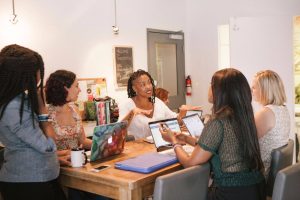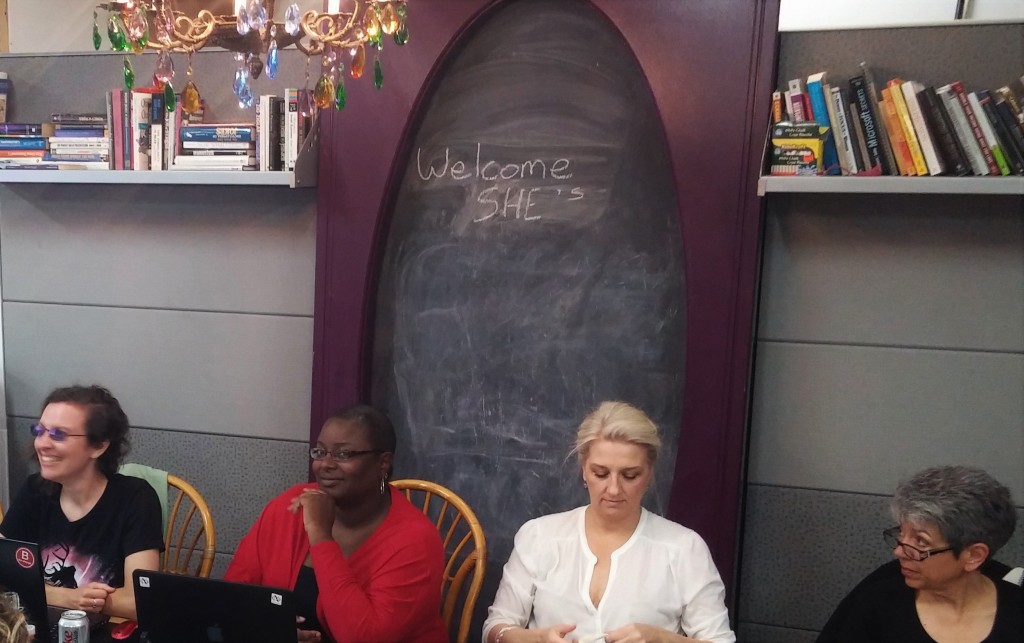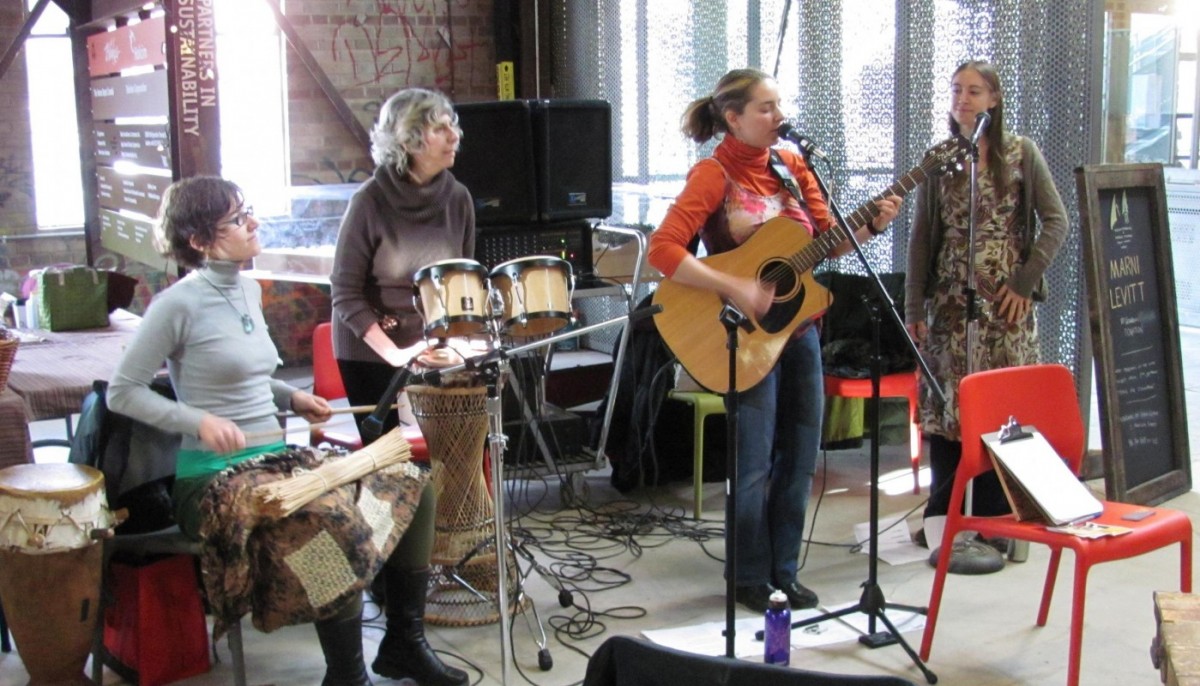
“Comfort & Joy” photo by: Jack Jackson
VIEWPOINT
Pinch me, I must be dreaming.
That’s how I felt standing next to Gloria Steinem in Toronto last week. Steinem is now eighty-four years old and still wearing boots with five-inch heels.
The woman is beyond inspiration.
A powerful voice for feminism, as well as a professional and personal governance role model extraordinaire, Steinem makes no apologies about her views on patriarchy as a persistent rapacious force of devastation for both half the planet and the environment. She is genuine when she says she wants to (still) change the ridiculous situation in the US.
And at a time of year that can be a bowl of mixed nuts for many, it was grounding to hear the words from a woman who never gave up on the movement or the fight. She’s been ridiculed, criticized, heckled, and slammed for her ideas of equality and fairness. But she kept going, continually unearthing, learning, leveraging her incredible humanity, creativity, and wicked wit to advance gender equality.
During the panel session which followed her keynote, Steinem was asked if she believed that a gender just world would be possible by 2030. Seven hundred of us attending the “Courage of A Movement” event waited in suspense.
After a few moments, she replied “I’m a hopeaholic. Yes, we do need to be realistic. But I do think hope is kind of planning. I have to say that part of the good thing about being old and I am very old, is that we remember when it was worse. We can all see how bonkers [patriarchy] is and that’s why we need to work together-the young and the old.
We each have something to bring. So I’ll bring hope. You bring anger. And there’s no stopping us.”
Wow. With that, I left feeling joyous and full of ambition for 2019.
Read the full VIEWPOINT here.
THIS WEEK ON LIISBETH
The Entrepreneurial Feminist Forum 2018 snapshot review by Jack Jackson.
Music credit: This Changing Life by Joan Armatrading
What the EFF? Wow. The 2018 Entrepreneurial Feminist Forum was a jam-packed two days of provocative talks, lab sessions, “think and do” workshops, movement classes, and creative writing practice. Overall theme? CONNECT + TAKE ACTION. We’ll have a full report next year but for now, check out these SIX action items from the forum here.
Shecosystem coworking and wellness space, Toronto, Canada
If you’re working at an organization that is closing, the story of Shecosystem shutting their doors might give you renewed hope and a different perspective. As we usher in a new year, perhaps identifying what needs to end, change, or be “shecomposted” in your business (or life!) is worth a closer look. Read Sue Nador’s piece on how shecomposting is fertilizing new ground here.

It’s Campaign Season! If you think our advocacy for women and gender-non conforming entrepreneurs is worthy, or you find our content of value professionally, we hope you will consider contributing to our 2018 Patreon Fund Raising Campaign. Each online magazine refresh and newsletter takes a community to create and disseminate. We have 2000+ subscribers, but less than 30% contribute financially. We are open access and rely 100% on reader donations. Our impact is measurable. So if social justice and economic transformation are on your intentions and gratitude list this year, here’s your chance to donate to LiisBeth.
LIISBETH FIELD NOTES
Carol Anne Hilton speaks at the EFF 2018 on Indigenomics
When Giants Break Free-A New Reality for Indigenous Relations in Canada
On Dec 5th, EFF speaker Carol Anne Hilton’s report on the indigenous economy in Canada and its potential to reach $100B by 2023 was released. The report says that if achieved, “total Aboriginal income would be greater than the level of nominal GDP of Newfoundland and Labrador and Prince Edward Island combined.” Hilton is the founder of the Indigenomics Institute, an economic advisory group launched in 2018 that works with public governments, Indigenous communities, and the private sector to overcome economic barriers imposed on Indigenous communities. You can read the full report here.
Photo credit: www.isachandra.com
Vegan Egg Nog?
Isa Chandra Moskowitz is the best-selling author of Isa Does It and Veganomicon, and her restaurant Modern Love has locations in Omaha and Brooklyn. Her recipes are equals parts humour and delight. Cheers to Isa’s Matrioshka Eggnog recipe for a creative twist on a holiday favourite!

Huge kudos to Christina Zeidler, Chief Alchemist and founder of Toronto’s hottest art hotel, the Gladstone Hotel, and their entire staff for developing and implementing a feminist business framework that guides business decision making and operational practice. Zeilder and her colleague, Chris Mitchell presented their framework and the journey undertaken to get there at the recent Entrepreneurial Feminist Forum. You can read more about feminist business practice at the Gladstone here. Better yet–just go and stay there! You will feel the difference.
Food Starter entrepreneur Eden and founder of Coco and Al promoting her Keto friendly baked goods at Food Starter’s booth at the St. Lawrence Farmer’s Market
One-Eyed Innovation Mindset At Work
On Dec 11th, Ontario’s only food processing startup incubator, Food Starter, announced the need to close its doors by January 31st, 2019, leaving 160 self-employed food entrepreneurs and growth stage companies without accessibly to well-priced food processing resources and a place to make their products. Over 65% of Food Starter’s clients were women and 80% were people of colour and/or newcomers. Programming which supported their market feasibility assessments and commercialization will also cease.
Meanwhile, just a few miles away, McMaster University announced another $1M in federal funding to expand its tech incubator. Down south, the city of Chicago proudly announced the opening of a new, 67,000 square foot, $34M food and beverage incubator known as “The Hatchery” — with shared kitchens, storage, and office space for roughly 100 startups.
Let’s be clear. Food Starter had sustainability issues from its inception—and not all of them were related to funding. They were however, not intractable. A longer runway would have gone a long way to provide the time needed to sort them out.
The enterprise needed just $500K per year to continue to advance food entrepreneurship in Toronto and beyond. That’s a drop in the bucket compared to the amount of money poured into tech incubation–and conferences like Elevate in Toronto –and across the country every year.
You can’t eat a computer. Just sayin’.

Photo by Elliott Stallion on Unsplash
NEW! LIISBETH STORY VOTE
HEY! HAVE YOUR SAY!
We receive MANY queries and asked you last month to choose your favourite from our top 3 but…only got ONE vote 🙁
So let’s give it another try!
Below are the top 3 story ideas we’ve received recently: VOTE HERE for your TOP PICK.
OR tell us what you want to read in LiisBeth 2.019!
1. The Duality of Entrepreneurial “Struggle Porn” and Unseen Women’s Labor from a business owner in the gaming industry
2. Portrait of Swedish Feminist Party leader Gudrun Shyman
3. Women are the backbone of Africa’s labor force but lack of opportunities to advance. Why a conducive environment for African women to thrive makes sense.
FEMINIST FREEBIES
LAST CALL! 2 x SIGNED COPIES of Gender Physics by Betty-Ann Heggie. Share our Patreon page on the social media platform of your choice and email us your mailing address here and you got yourself a sweet holiday read.

WHAT WE’RE READING

Essential for everyone who feels overwhelmed and anxious about our hyper-connected world—whether you’re a corporate lawyer, a student, a sales person, or a yoga instructor—How to Not Always Be Working includes practical suggestions and thoughtful musings that prompt you to honestly examine your behavior—how you burn yourself out and why you’re doing it. A creative manifesto for living better, it shows you how to carve sacred space in your life. This book is a quiet revolution, a guide filled with practical advice to help you curb your obsessions and build boundaries between your work, your job, and your life. – Indiebound.org
Marlee Grace lives on the rural coast of California. She works with improvisation as a method for navigating being alive and making work through movement, quilting, writing, and podcasting.

By effortlessly telling this short, intense tale in the voice of an unnamed, ungendered (and brilliantly unreliable) narrator, Dionne Brand makes a bold statement not only about love and personhood, but about race and gender–and what can and cannot be articulated in prose when the forces that inhabit the space between words are greater than words themselves. – Penguin Random House Canada
“Theory is a book for those who are intrigued by how a brilliant thinker approaches lost love, unmet potential and unreliable narration. But if none of that appeals to you, Brand’s gorgeous prose and sly humour will definitely win you over. ” – Sadiya Ansari, The Star
AND FINALLY . . . IN CASE YOU MISSED IT!
-
New $9M Women’s Entrepreneurship Knowledge Hub Announced! And the Hub grant was given to Ryerson University. What do people think? Read all about it here.
-
Women human rights defenders are under threat worldwide and Amnesty International has chosen to focus all of this year’s Write for Rights cases on courageous women peacefully advocating for human rights. December 10th was International Human Rights Day but the Writeathon.ca continues. Take action here
-
On the lighter side, looking for something different to make for dessert this holiday season? Check out this amazing sweet potato pie recipe by Eden Hagos, founder of Black Foodie. Brown sugar, nutmeg, cinnamon, sweet potatoes…mmmmm.
-
Jennifer Armbrust, founder of Sister and an L.A. based feminist business school and a coach for embodied business practice has launched a new book called Proposals for the Feminine Economy! Check out her website and the book which offers 100 pages of proposals, principles and photos here.
-
Baby, It’s Cold Outside Controversy–Innocent Traditional Song? Or Precursor to Date Rape? “I think the song has always been creepy, but we didn’t have the words to explain why,” said Lydia Liza, 24, a singer-songwriter. Check out this New York Times article and let us know what you think by tweeting us @LiisBethHQ
That brings us to the end of our December newsletter, the last of 2018! It’s time for the LiisBeth team –and you–to take a break, allow time for self care and reflect on where to take this work in 2019.
To date, we have published 49 newsletters and 168 original feminist business practice stories along with advocacy pieces to help shine a light on this growing community. We have mounted two Entrepreneurial Feminist Forums with our partner, Feminists At Work, and have loved every minute of serving this community and others, working to advance gender and social justice.
As our holiday offering this year, the LiisBeth editorial team (Lana, Margaret and I) donated $200 to help advance the mission of Match International-an international women’s fund working at the intersection of women’s rights and innovation.
Thank you all for your support, volunteer time, feedback, participation, and encouragement. We could not continue to do this work with out you and your readership.
Have a great holiday season, no matter what you celebrate.
We will be back mid-January–with pens and hearts a blazin’–and a lot of good news for 2019!
Namaste, Cheers, and Peace,

















